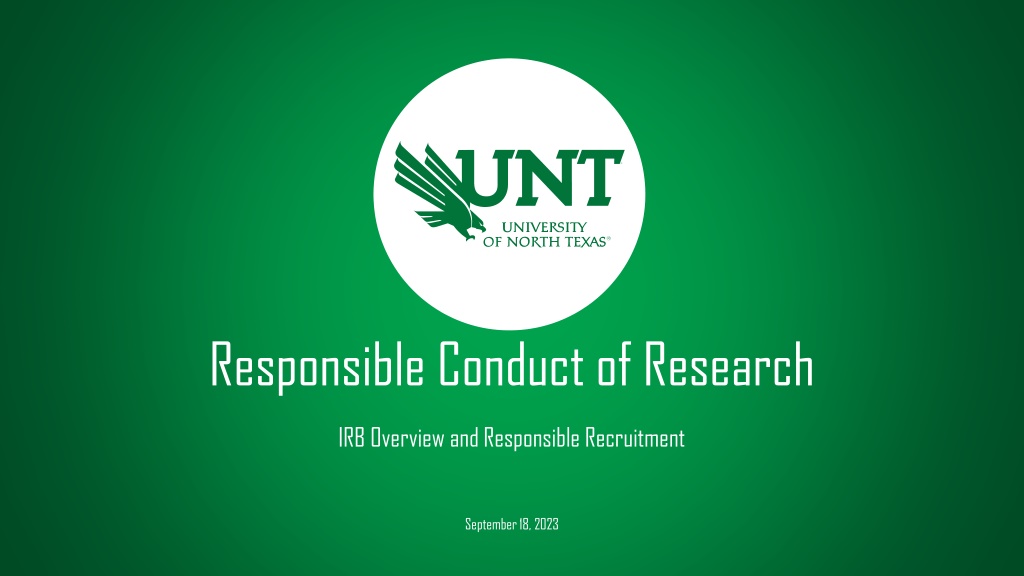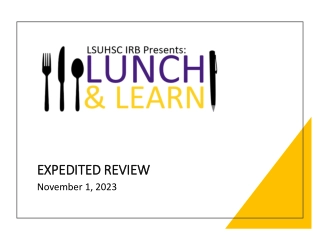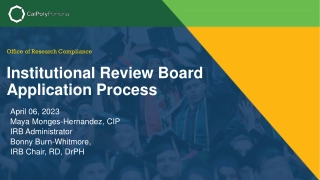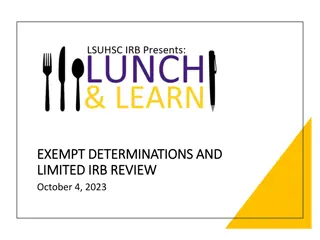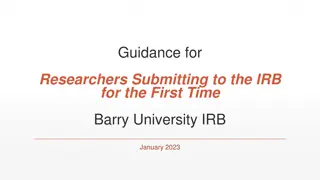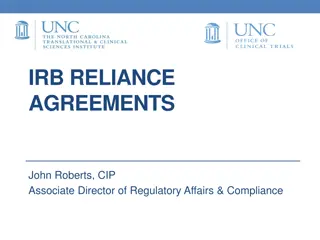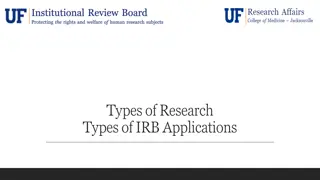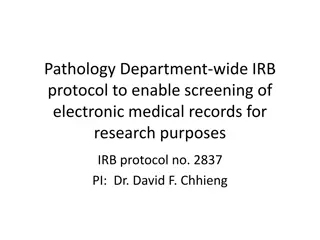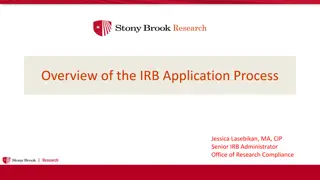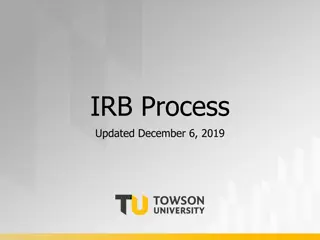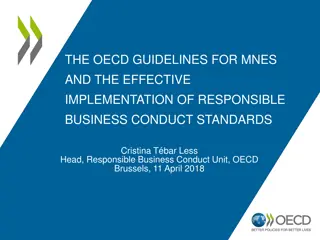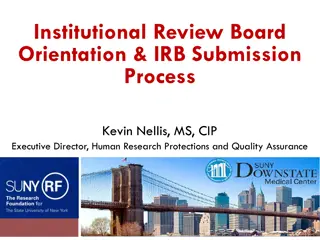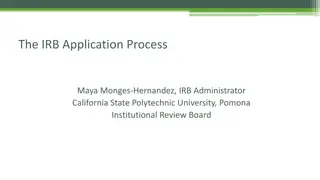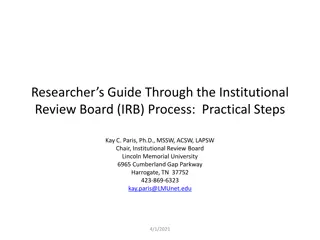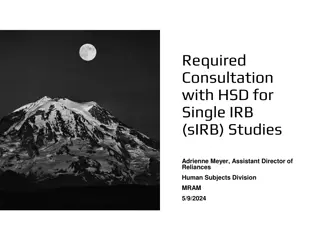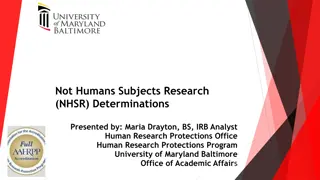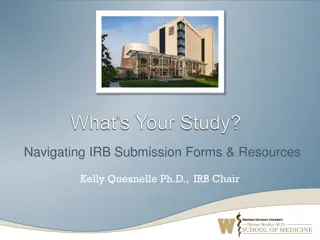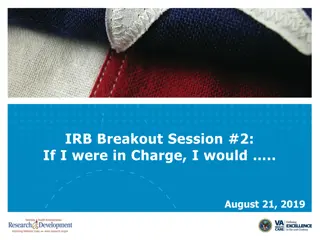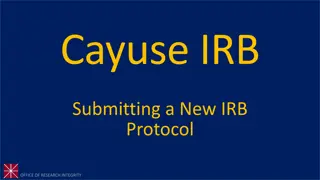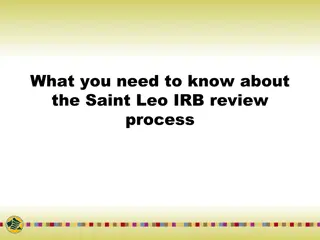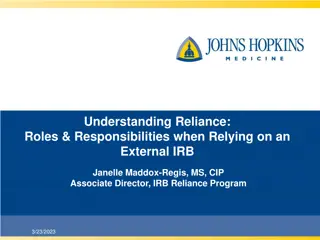Understanding Responsible Conduct of Research and IRB Overview
Delve into the world of research ethics through an overview of Institutional Review Boards (IRB), regulations governing human subjects research, historical events shaping research ethics, and examples of research controversies. Explore key ethical principles and the role of the IRB in protecting research participants' rights and welfare.
Download Presentation

Please find below an Image/Link to download the presentation.
The content on the website is provided AS IS for your information and personal use only. It may not be sold, licensed, or shared on other websites without obtaining consent from the author. Download presentation by click this link. If you encounter any issues during the download, it is possible that the publisher has removed the file from their server.
E N D
Presentation Transcript
Responsible Conduct of Research IRB Overview and Responsible Recruitment September 18, 2023
Division of Research and Innovation Research Integrity and Compliance Jamie Peno Assistant Vice President Chris Mc Mullen Sr. Administrative Coordinator Autumn Pinckard Director Sarah Romack Sr. Research Compliance Analyst (COI) Dr. Veena Naik Biosafety Officer (IBC) Daniel Bassett Research Compliance Manager (IRB) Dr. Imelda Norton Research Animal Lab Manager Please scan the QR codes for more information on the topics in the slides! Joan Powers Sr. Research Compliance Analyst (IRB) Rodney Fernandez Research Compliance Analyst (IRB)
The Regulations 45 CFR 46- Common Rule Federal regulations that govern Human Subjects Research Provides guidance in the protection of the rights, welfare, and wellbeing of human subjects involved in research conducted or supported by the U.S. Department of Health and Human Services (HHS) Department of Health and Human Services Office for Human Research Protections (OHRP) The Declaration of Helsinki (1964) World Medical Association Ethical principles for medical research involving human subjects The Belmont Report (1979) National Commission Three key ethical principals that form the ethical foundation for federal regulations 1. Respect for persons 2. 3. Beneficence Justice
Before the Regulations Tuskegee Study (1932-1973) Doctors studying the effects of syphilis on participants whilst denying them the benefits of any treatments Stuttering Study (1939) Abuse of Children in an orphans home to try to prove stuttering can be induced. Nuremburg Trials (1946) Criminal proceedings were brought against 23 German doctors for participating in war crimes and crimes against humanity. PRIM&R - Research Ethics Timeline (primr.org)
Always Changing The Immortal Life of Henrietta Lacks (2010) Henrietta Lacks died in 1951 from cervical cancer at age 31. Her cancer cells were the originators of the HeLa cell line, an incredibly robust line that has contributed to countless scientific advances over the years. She received no compensation or recognition. Facebook Emotional Contagion Study (2014) Facebook conducted an experiment in which the news feeds of over 600,000 Facebook users were manipulated without their knowledge or consent. The study, published by the Proceedings of the National Academy of Sciences in 2014, purported to show that emotional contagion, a well-characterized phenomenon in offline environments, also occurs online. -PRIM&R - Research Ethics Timeline (primr.org)
Institutional Review Board (IRB) Operating under a Federal-wide Assurance (FWA) issued by the Office for Human Research Protections (Part of the U.S. Department of Health and Human Services) Concerned with protecting the welfare, rights, and privacy of human subjects in research Reviews all proposed research projects involving human subjects to be conducted at UNT Or to be conducted at any location by UNT faculty, staff, and students in connection with their institutional responsibilities. Vice Chair Chair IRB: Minimum of 5 members, (often more) made up of: Alternates for each position Scientist(s) Community Members (not affiliated with the Institution) Non-Scientist(s)
Institutional Review Board (IRB) Does my work with Human Subjects require review at UNT? Research The systematic investigation, including research development, testing and evaluation, designed to develop or contribute to generalizable knowledge. 1 Submit an HSR Determination request to get a formal letter from the IRB! Human Subject 2 A living individual about whom an investigator conducting research obtains data through the intervention, or interaction with the individual or their identifiable private information. IRB 3 An administrative body established to protect the rights and welfare of research subjects recruited to participate in research activities conducted under the oversight of the institution with which it is affiliated.
Institutional Review Board (IRB) Who can be a Principal Investigator on an IRB at UNT? Principal Investigators (and Co-PI s) must be: A Full-time UNT faculty member A Full-time staff employee whose job responsibilities include conducting human subjects research Cannot be: A Student A Lecturer* An Adjunct Instructor* *May provide a letter or email from your Department Chair that acknowledges your research endeavors. "Scientist" by stavos is licensed under CC BY-NC-ND 2.0
Institutional Review Board (IRB) How can I prepare my study for IRB submission? Plan ahead to allow a sufficient amount of time for submission, review and approval of your study. The current review timeline is posted in a message in the Cayuse system Timeline will depend on the volume of submissions received by the IRB office. Timeline is impacted by many variables and will vary throughout the year. Please reach out to the office at untirb@unt.edu if you have questions regarding the posted review timeline. Protocols that are incomplete or lack details will be returned. Please review all study documents to assess the readiness for review.
Institutional Review Board (IRB) How can I prepare my study for IRB submission? Please use our UNT IRB templates and guides! Gather all your attachments. These attachments can include but are not included to. Informed Consent Forms/Notices Waiver or Alteration of informed consent notice Surveys/Questionnaires Training Completion Certificates Scope of work for any proposal for internal or external funding for the study. Recruitment Materials(flyers, email scripts, classroom announcements, advertisements, etc.) ISD approval Departmental approval Institutional approval A copy of all data collection instruments, interview scripts, and intervention protocols. This Photo by Unknown Author is licensed under CC BY-ND
Institutional Review Board (IRB) What type of training do I need to complete? Researchers and all research team members must complete required training before they will be eligible to receive IRB approval. Complete the Collaborative Institutional Research Initiative (CITI Program) course: Social & Behavioral Research - Basic/Refresher Biomedical Research - Basic/Refresher Training must be renewed every 3 years Additional Trainings: Responsible Conduct of Research (RCR) Good Clinical Practice Custom upon request Email ORIC@unt.edu data collection site (other than UNT) Example: ISD approval
Institutional Review Board (IRB) How do I submit my study for review? Cayuse Access To get access to Cayuse Human Ethics submission portal, submit access request form: https://research.unt.edu/cayuse-access-access-change- request 1 Cayuse Human Ethics https://unt.cayuse424.com/rs/irb/ Submit 1. 2. 3. 2 Log in to Cayuse Human Ethics portal Use EUID and EUID password to log in. Upper right-hand corner blue button + New Study Enter title of study and click save. blue button + New Submission Select Edit. Add personnel (Remember rules about being a Principal Investigator) Complete submission and mark complete Principal Investigator mark certify Once the principal investigator certifies, the submission will be received by the UNT IRB. 4. 5. 6. 7. 8. 9. For Technical issues contact cayusetechsupport@unt.edu For study content or IRB process questions contact untirb@unt.edu
Institutional Review Board (IRB) What does the IRB review process entail? IRB submissions are reviewed in the order that they are received. Check the status of your protocol in the Cayuse IRB System from your Cayuse Dashboard. Respond Review Approval Documents Analyst Pre-Review Based on the risk of your study, you will be assigned a review category by the Research Compliance Analyst or Board Member: Research Compliance Analysts will conduct an initial review. Please complete the revisions in their entirety ASAP and resubmit the revised documents within the Cayuse IRB System. Once you have satisfied all necessary requirements, and approval is issued, we will: Email study contacts a copy of the Approval Letter If revisions are needed, we will return the study to you in the Cayuse IRB System for edits. Exempt :: Minimal Risk :: Reviewed and approved within the Compliance Office. Attach your stamped informed consent document to your Cayuse IRB Study Expedited :: Sent to a secondary reviewer (IRB Board Member) for final review and approval. Full Board :: Reviewed by the IRB Members at a monthly meeting:: Requires annual renewal.
My study is approved! What else do I need to worry about? Modifications: Any changes to your final approved study must be approved by the IRB Submit a modification form before you implement any changes (i.e. adding key personnel, increasing recruitment, changes in study procedures, etc.) Continuing Reviews: Full Board studies MUST be renewed each year before it is set to expire. We send 90-day, 60-day, 30-day, and day of expiration reminders to you via e-mail. If you do not renew your protocol by the expiration date, your protocol will be administratively closed, and you will not be able to use the data you collect after the expiration date. Reportable Events: Any adverse effects, unanticipated problems, and protocol deviations or errors must be reported to our office.
Recruitment Best Practices Common recruitment methods Things to be mindful of Recruitment Templates/Examples
What are some ways that you have (or plan to) recruit participants for your research?
Common Recruitment Methods Email Crowdsourcing Platforms Amazon MTurk Qualtrics Panels In Class Announcement/ Scripted Presentations SONA Face-to-face recruitment Listservs Flyer Social Media Facebook Twitter Instagram Snowball Sampling
Obtaining Permission Depending on the avenue of the recruitment you may need to get written permission from leadership/admin: Admins of Social Media groups Ex: Facebook groups, subReddits, chats, private servers, etc. Email Listservs Private businesses/organizations Other universities or schools including K-12
Obtaining Permission (Cont.) Permission is generally NOT required for recruitment through: Public spaces e.g. notice boards A researcher s personal social media accounts Contacting people who s information in publicly available
Things to Keep in Mind Participant demographics: In general, care must be taken to not exclude participants unnecessarily This ties directly back to the concept of justice in Belmont Report Are your recruitment methods going to reach a representative sample? Translated Documents for Non-English-Speaking Participants Documents must be made available in the participant s primary spoken language If you are recruiting from an area that has a high number of participants that do not speak English, consider this when creating recruitment materials. Would translating the recruitment flyers allow you to have a more representative sample? Don t rush it! Allow sufficient time for prospective participants to consider whether or not they are interested in proceeding to the consent process.
Things to Keep in Mind (Cont.) Avoiding coercion and undue influence in recruiting: Instructors/students; Bosses/employees Anywhere there is an imbalance of power, there is the potential for undue influence or coercion Student emails: Not available in general not considered directory information by registrar's office Student emails may only be used from listservs currently available to the researcher Vulnerable Populations There may be additional considerations if you are recruiting children, prisoners, people with intellectual disabilities, and other vulnerable people
Recruitment Flyer Examples & Templates Current Internal Resources Recruitment Material should include: "University of North Texas Name of Department The word "research Official title of study Location of research (if online, use, "online") Inclusion criteria Purpose of study Study procedures and time requirement Type and amount of compensation (if any) PI name and contact information UNT IRB Forms: Recruitment Flyer Recruitment Email
Recruitment Materials/Templates Make it Stand out! Canva (free and pro) Canva has a variety of premade templates to choose from. Even without the purchase of pro, there are still a lot of options to choose from. Microsoft Office Like Canva, Office has recruitment templates to choose from as well. However, it is limited in what you can design with it. Design Works
ResearchMatch ResearchMatch is only available to be used for Health-related research studies. ResearchMatch is a national registry of patients interested in volunteering for medical research. Anyone can register with ResearchMatch even healthy volunteers. This can be a great tool to use if you are looking to recruit participants for a health-related project. If you are interested in learning about health-related research, YOU can sign up as a volunteer!
Informed Consent 101 Required Elements of Informed Consent Documenting consent Resources available to UNT Investigators
Informed Consent as a Process Informed consent is a process that begins with the recruitment and screening of a subject and continues throughout the subject's involvement in the research. Process includes: Providing information about the study to subjects in a way that is understandable to them. Answering questions Make sure the participant(s) understand the research and their role in it. Giving subjects sufficient time to consider their decisions. This image by NIAID is licensed under CC BY 2.0. Obtaining the voluntary agreement of subjects to take part in the study. The agreement is only to enter the study. Subjects can decide to withdraw at any time, decline to answer specific questions, or complete specific tasks during the research.
What does an Informed Consent need to include? Federal regulations at 45 CFR 46 (Protection of Human Subjects 2018) list specific elements of information that must be provided to subjects about informed consent. Basic elements: 1. A statement that explains: 1. the study involves research, 2. the purposes of the research 3. the expected time commitment, 4. description of the procedures to be followed 2. Description of any foreseeable risks. 3. Explanation of any benefits to the subject and/or field of study. 4. Alternative procedures or courses of treatment (if applicable) 5. Contact information for participants to contact if they have questions. 6. A statement that participation is voluntary. The subject may discontinue participation at any time without penalty or loss of benefits. Photo by sepyle86 is marked with Public Domain Mark 1.0.
What does an Informed Consent need to include? (Continued) Additional elements: Depending upon the nature of the research and the risks involved, there may be additional required elements, as noted in the regulations at 46.116(c). Recruitment is part of the consent process Begins process of providing information about the study. Photo by sepyle86 is marked with Public Domain Mark 1.0. All recruitment materials (fliers, emails, phone scripts) must be reviewed and approved by an IRB before they are used.
Documenting Informed Consent Ways to obtain Informed Consent: 1. Signed signature (preferred) Physical Paper Electronic via email or Adobe Must have a unique signature signed by the participant or their Legal Authorized Representative 2. Electronic (requires a Waiver on file) Often used for online survey studies. The participant can select a radio button that says I have read and understand the consent information. I agree to take part in this research 3. Verbal/Oral (requires a Waiver on file) Rarely used This image by NIAID is licensed under CC BY 2.0. Waiver/Alteration of Informed Consent The federal regulations allow researchers to modify or waive the consent process.
Informed Consent Templates We have templates available on our Forms and Templates webpage! Search: UNT IRB forms If you are obtaining electronic consent through an online survey, don t forget to complete the Request for Waiver or Alteration All consent documents (and waivers) should be uploaded to in Cayuse submission
Responsible Conduct of Research(RCR) Workshops Fall 2023 IRB- Human Subjects Research COI- Conflict of Interest International Affiliations Biosafety September 19th September 26th October 17th November 14th Via Zoom at 2:00 pm Via Zoom at 2:00 pm Via Zoom at 2:00 pm Via Zoom at 2:00 pm Overview of the UNT COI program. Overview of UNT IRB Overview of UNT's biosafety program. Overview on how to navigate international affiliations in research. Information on how to prepare a human subject's application for submission Difference between research conflicts of interest (RCOI) and institutional conflicts of interests (ICOI). Lab safety International affiliations disclosure process Guidance on biological safety and risk assessment for work involving biological agents and genetically modified organisms. Basics of Informed Consent Visiting Scholars program Recruitment Methods Considerations for competitive small business funding programs such as Small Business Innovation Research (SBIR) and Small Business Technology Transfer (STTR). Compliance requirements related to international affiliations in research.
Questions? THANK YOU! Phone: 940-565-4643 Email: untirb@unt.edu Messaging on Microsoft Teams One-on-one meetings by appointment via Microsoft Teams or Zoom
